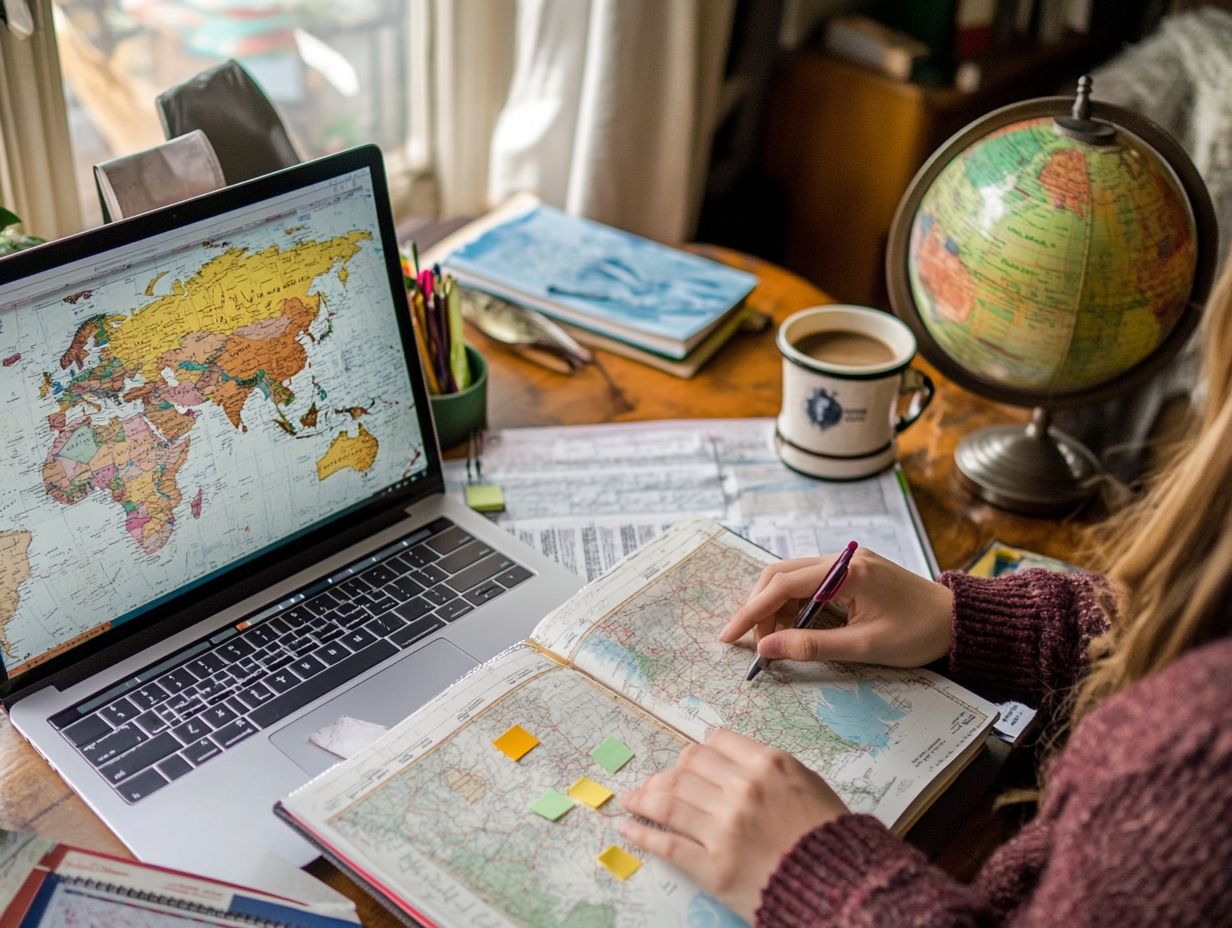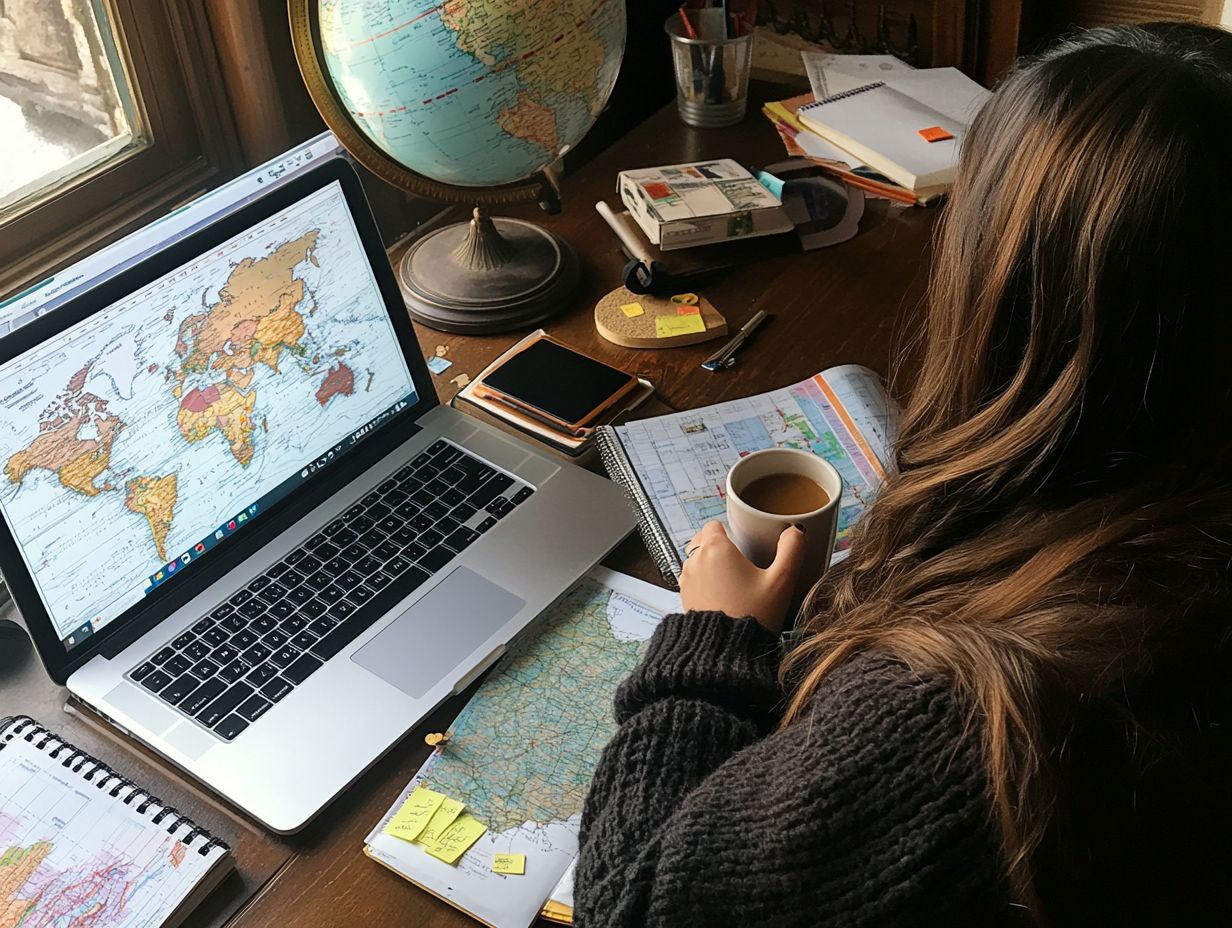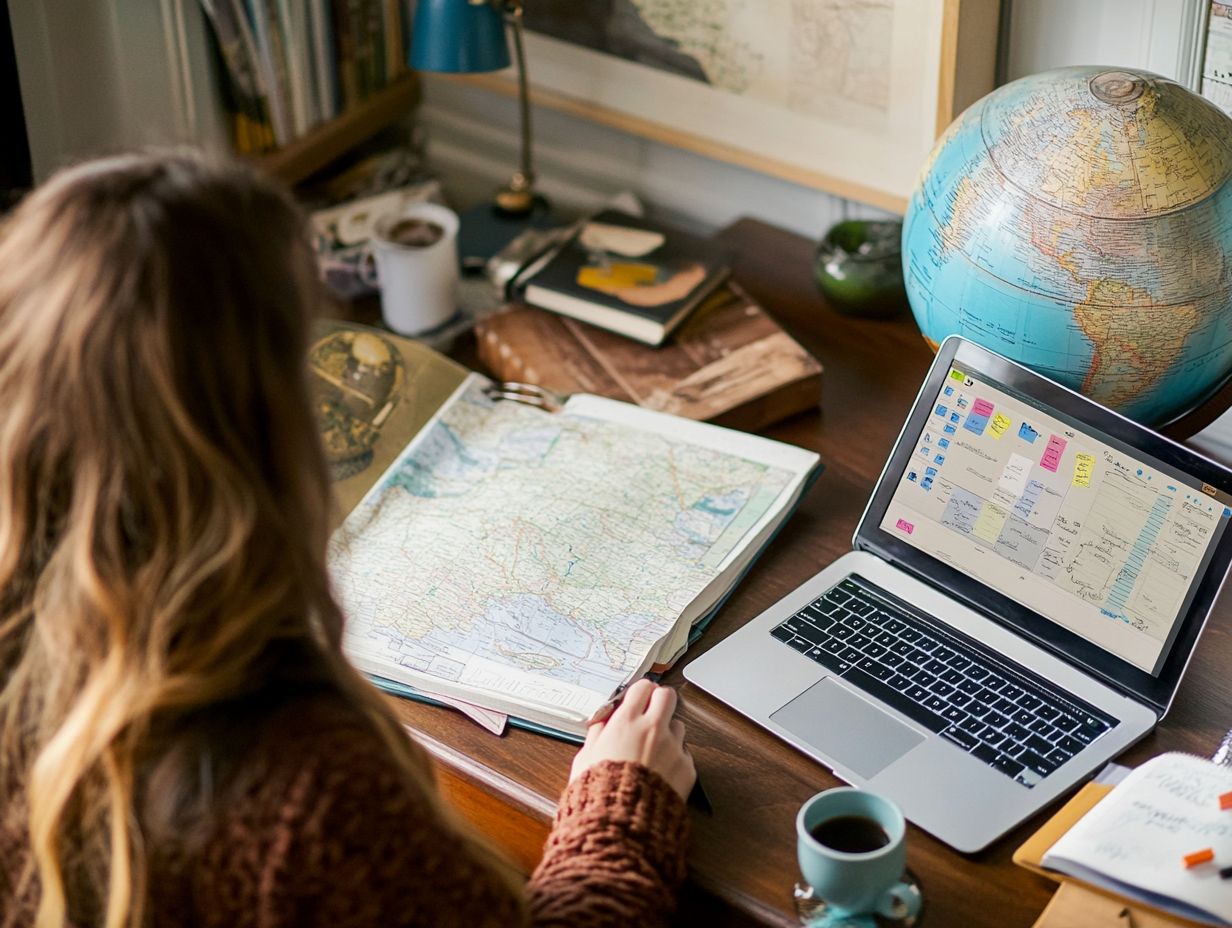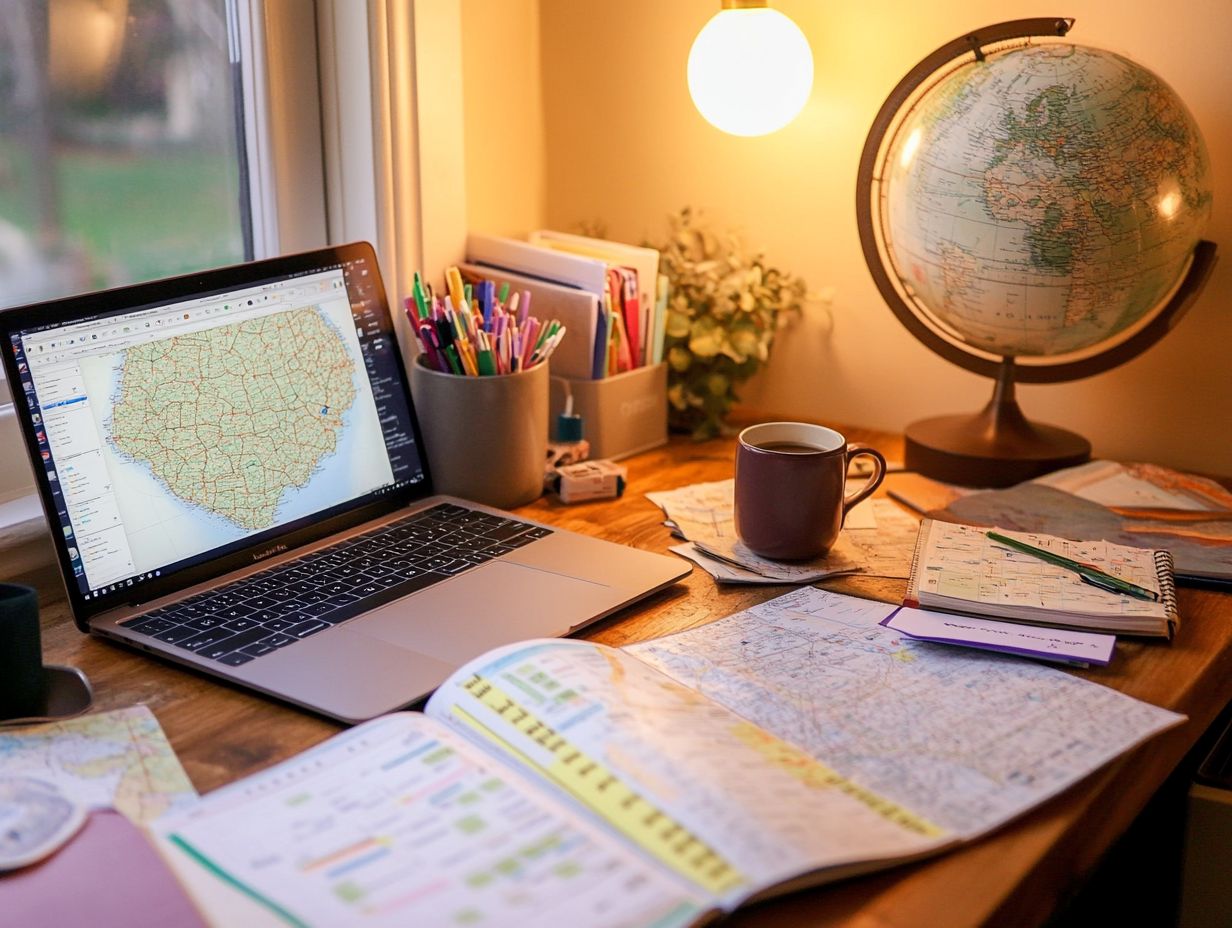How to Stay Organized While Studying Abroad
Studying abroad is nothing short of an exhilarating adventure, but organization is the secret ingredient that can elevate your experience to new heights.
From selecting the perfect program and managing crucial paperwork to crafting a study schedule that actually works for you, every detail calls for careful planning.
This guide will walk you through the essentials of preparing for your journey, offer strategies for managing coursework, and provide tips to keep you organized in a new environment. This guide also helps you balance your studies with cultural experiences. Whether you re a seasoned traveler or stepping out of your comfort zone for the first time, these insights will empower you to not just survive, but truly thrive during your study abroad experience!
Contents
- Key Takeaways:
- Preparing for Studying Abroad
- Creating a Study Schedule
- Managing Coursework and Assignments
- Communication with Professors and Peers
- Staying Organized in a New Environment
- Tips for Keeping Living Spaces and Belongings Organized
- Dealing with Culture Shock and Homesickness
- Making the Most of Your Study Abroad Experience
- Frequently Asked Questions
- How can I stay organized while studying abroad?
- What should be included in my study abroad schedule?
- Why is it important to keep important documents in one place?
- How can I declutter my study space while studying abroad?
- What are some helpful tools for staying organized while studying abroad?
- What can I do to stay mentally organized while studying abroad?
Key Takeaways:

- Research and choose a program that fits your academic and personal goals. Consider location, language, and cost.
- Organize necessary documents and paperwork in advance to avoid stress and delays. Keep digital and physical copies for easy access.
- Create a study schedule that includes time for exploration and cultural immersion. Stick to it by setting realistic goals and managing your time effectively.
Preparing for Studying Abroad
Preparing for your journey to study abroad is both exhilarating and challenging, particularly when you think about the many factors at play. Choose the program that excites you and fits your goals, navigate the subtle differences in customs and behaviors, and ensure that all your documents are carefully organized.
As you aim to elevate your academic experience at esteemed institutions like the University of Granada in Spain, comprehensive pre-departure planning becomes paramount. This involves diving into financial aid options, establishing a connection with the study abroad office, and gathering the essential paperwork needed for a seamless transition into this new academic landscape.
Researching and Choosing a Program
When you’re researching and selecting a study abroad program, it s essential to look beyond the academic offerings of institutions like the University of Granada in Spain. You must also consider the cultural differences you may encounter along the way.
Evaluate the coursework carefully to ensure it aligns with your academic aspirations, while contemplating the program’s location and the potential for cultural immersion. Exploring nearby communities and regional traditions can significantly enhance your learning experience. Don t forget to seek out financial aid resources; they can lighten the financial load and make international studies more attainable.
Talk to past participants. They can share valuable insights into daily life, academic expectations, and social opportunities. This will enable you to make a more informed decision as you embark on this transformative journey.
Organizing Necessary Documents and Paperwork
Organizing the necessary documents and paperwork is a crucial step in your study abroad journey, ensuring that all required materials, such as acceptance letters and insurance policies, are ready well in advance.
Beyond just acceptance letters, compile essential documents like travel insurance and health insurance policies to safeguard your well-being while overseas. It s also wise to keep copies of your academic transcripts and financial statements, as these may be requested by educational institutions or visa authorities.
The financial aid office is an invaluable resource, assisting you with guidance on scholarship opportunities and educational loans, helping you navigate your options with confidence.
By carefully preparing these documents, you can immerse yourself in your enriching international experience with peace of mind, focusing on the adventure that lies ahead. Start gathering your documents now to avoid last-minute stress!
With the right preparation and mindset, your study abroad experience can be one of the most rewarding adventures of your life!
Creating a Study Schedule
A study schedule is crucial for managing your time while studying abroad. It helps you balance coursework with personal exploration and keeps procrastination at bay.
This structured approach enhances your academic performance and helps you develop valuable organizational skills that will serve you well throughout your life.
By thoughtfully planning your class schedule and allocating time for study, you can maximize your productivity and fully enjoy your new surroundings.
Factors to Consider for Time Management

Effective time management is essential for students studying abroad. It weaves together various factors that significantly influence both your academic and personal experiences.
One crucial aspect is setting priorities. Decide which tasks are most important for your success, striking a balance between assignments, projects, and necessary downtime.
Understanding your personal productivity peaks is also important. Recognizing when you re most alert and focused can lead to more effective study sessions. By allocating time for your studies and leisure activities, you stay refreshed and engaged, effectively warding off burnout.
The consequences of procrastination can be detrimental, leading to unnecessary stress and incomplete assignments. Embracing productivity cultivates better organizational skills, resulting in a more structured and fulfilling academic journey.
Tips for Sticking to a Schedule
Sticking to a study schedule demands discipline and commitment, but you have effective strategies to stay focused and adhere to your plans.
One beneficial practice is setting reminders through digital calendars or apps to ensure those important study sessions remain front and center.
Consider forming study groups. They can provide essential peer support, fostering motivation and accountability among your classmates.
Regularly review and adjust your study schedule. This allows for flexibility, accommodating any shifting commitments or challenges that arise.
By honing your organizational skills, like maintaining a tidy workspace and using checklists, you create a more structured approach, paving the way for a smoother journey toward your academic goals.
Managing Coursework and Assignments
Effectively managing your coursework and assignments while studying abroad is crucial for sustaining your academic performance and staying safe during your experience.
Implement smart study techniques, like using flashcards and enlisting the help of a local tutor, to deepen your comprehension of challenging subjects.
This approach allows you to excel academically while balancing your educational pursuits with enriching cultural experiences.
Strategies for Keeping Track of Assignments
Keeping track of your assignments is essential for managing your coursework effectively. Employing the right strategies can significantly reduce last-minute stress.
Utilize planners or digital tools that resonate with your preferences. This will help you visualize your upcoming tasks clearly.
Whether you choose a classic physical planner or a convenient app, integrate your class schedules into these systems. This cohesive approach aids in prioritizing assignments and enhances your overall organization.
By honing your organizational skills, you ll manage your time efficiently, ensuring you stay ahead of deadlines and responsibilities. This paves the way for improved academic performance.
Communication with Professors and Peers
Effective communication with your professors and peers is crucial for your academic success while studying abroad. It creates a supportive learning environment and deepens your understanding of the coursework.
When you take the initiative to reach out for help, you not only clarify your doubts but also build valuable relationships that enrich your educational journey.
Forming study groups becomes essential in this context; it allows you to share insights, tackle challenging topics collaboratively, and benefit from diverse perspectives.
Engaging with local tutors offers tailored academic support, ensuring that your specific needs are addressed effectively. These connections not only enhance your comprehension of the material but also foster a sense of community, making your overall experience more fulfilling and productive.
Staying Organized in a New Environment

Navigating a new environment as a student studying abroad can be quite the challenge, especially as you encounter cultural differences and grapple with feelings of homesickness. To make the most of your experience, consider some tips for staying motivated to explore while abroad. Developing good organization habits becomes essential for creating an effective study space, enabling you to maintain focus on your academic responsibilities while adapting to your new surroundings.
One practical approach is to assemble a portable study kit. This will ensure that your study materials remain organized and easily accessible whenever you need them.
Tips for Keeping Living Spaces and Belongings Organized
To cultivate a productive study environment while studying abroad, keeping your living space and belongings organized is absolutely essential. For more insights, check out these tips for effective study habits abroad.
A clutter-free space not only enhances your focus but also fosters a sense of calm both of which are crucial for effective studying. Regularly decluttering can significantly minimize distractions, allowing you to immerse yourself fully in your academic pursuits.
Embrace smart storage solutions, such as bins and organizers, to categorize your materials, making it effortless to locate study essentials exactly when you need them.
Creating a dedicated study area, stocked with all the necessary supplies, enables you to establish a routine that nurtures concentration.
A portable study kit for your essential textbooks and notes will help you stay organized, ensuring that everything remains neatly arranged, no matter where your study session takes you.
Dealing with Culture Shock and Homesickness
Dealing with culture shock and homesickness is a common experience for anyone studying abroad, but there are effective strategies to help ease these feelings.
One of the most valuable approaches is to seek peer support. Connecting with fellow students who are facing similar challenges offers a sense of reassurance and understanding that can be incredibly comforting.
Engaging in local exploration not only helps you acclimate to your new environment but also enriches your overall experience. Participating in cultural events or local tours can significantly enhance your sense of belonging and make your time abroad more memorable.
Establishing a well-rounded routine that balances your academic commitments with social interactions and leisure activities will further aid your adjustment to this new lifestyle.
By embracing these strategies, you foster connections and cultivate a supportive network, making it easier to navigate the emotional landscape of being away from home.
Making the Most of Your Study Abroad Experience
Unlock the full potential of your study abroad journey by balancing academics with rich cultural experiences. This harmonious blend not only enhances your academic performance but also allows you to deeply embrace the local culture.
By actively engaging in exploration and seizing learning opportunities, while also nurturing peer support networks, you can significantly enrich your journey and promote meaningful personal growth.
Balancing Academics with Exploration and Cultural Immersion
Balancing your academics with exploration and cultural immersion is essential for maximizing your study abroad experience.
Create a structured schedule. This will help you prioritize academic responsibilities and dedicate time to cultural activities. Consider utilizing planners or digital tools to map out your deadlines, class schedules, and leisure time. Ensure that each day includes both study sessions and opportunities to engage with local traditions.
By setting clear priorities, you can effectively manage your workload and make room for visits to museums, attendance at local festivals, or meaningful connections with peers. This approach enriches your experience and boosts your personal growth!
Frequently Asked Questions

How can I stay organized while studying abroad?
To stay organized, create a schedule and keep important documents in one place. Decluttering your study space is also essential.
What should be included in my study abroad schedule?
Include class times and study time in your schedule. Don’t forget about any extracurricular activities or trips!
Why is it important to keep important documents in one place?
Keeping all your important documents, such as your passport, visa, and health insurance information in one place helps you stay organized. This way, you have easy access to them when needed.
How can I declutter my study space while studying abroad?
Avoid bringing unnecessary items and keep your study space free of clutter. Use organizers and storage solutions to maintain order.
What are some helpful tools for staying organized while studying abroad?
Utilize tools like a planner, calendar app, and digital note-taking software. Find what works best for you to stay on top of your tasks!
What can I do to stay mentally organized while studying abroad?
Set goals, practice time management, and stay in communication with your professors and peers. This will help you maintain mental organization.






